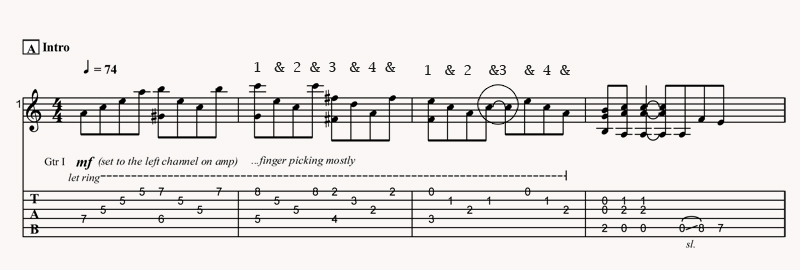We all learn Stairway to Heaven at some point, usually relatively early in our guitar playing journey. Once learned it is rare that we are ever called to play it in any real-time band situation. We play it; usually tossing off the intro on random occasions, at parties, while trying out guitars, playing for girls, or when our younger cousin or nephew comes over to visit. It becomes one of those songs. We’ve all got a few of them in our back pocket so-to-speak. Over time our true knowledge of the details and nuances of Stairway fade and it becomes that song we used to be able to play, but we never forget that intro – that’s always the money.
It had ben 30 years (almost 35) since I had last played Stairway with a band so I certainly fell into the category of “used to be able to play Stairway” when I decided to record a cover version at the command of my wife. Like the rest of you I knew I could still nail the intro though. I’d been doing that nearly my whole life.
Having set up the grid and time matrix for the Original Stairway Project it was time to sit down and record some scratch tracks to start fleshing out the arrangement. I set up the mics, got the click ready to go, readied myself to play the intro, then hit record. I got about 3 bars into the song and it all fell apart.Take two: 3 bars in going into the 4th and it all fell apart. Take 3: about 3 bars in and it all fell apart again…. Take 10: same result. Something was seriously wrong with my time somewhere in the 3rd measure. “Maybe it was the click?” I never trusted the click within the DAW anyway so I cued up my old college metronome to simultaneously run with the DAW’s click. On a test run they were both dead on accurate to each other. “Could it be me?” I started playing and again crashed into some imaginary wall somewhere in the 3rd measure. My whole world started falling in on me. “Had my musical abilities crumbled so much since my accident in the early 90’s that I couldn’t even play Stairway to a simple click track?”
I looked at the sheet music:

Ex.1 The first 4 bars. As I counted it out I realized I was blowing the count on the tied note in the middle of the 3rd bar.
I counted it out and quickly found where I was blowing it. The 4th note of the 3rd bar falls on the & of 2 and gets held to the 3 before the release. I seemed to be holding it at least an extra half beat – maybe even longer, and was coming into the 4th bar way too late.
I played it alone while I counted it out and sure enough I had to force myself to come back from the tied note to play the & 4 & pickup before the 4th measure. The correct way suddenly felt very rushed to me.
Then it dawned on me. All these years of whipping off the intro at gatherings, in quiet moments, or for friends, I had been playing a dramatic caesura (a musical pause) there for effect. I had done this so often that when the guitar was in my hands it became my natural inclination. I almost couldn’t NOT do it. Yet here I was faced with playing locked to the time grid of the DAW the merciless demands of time that has become typical in today’s modern recording. The old adage
Time Waits For No Man
was suddenly very applicable here.
I knew then that even if I could get my hands to a physical state where I could play, I was going to have to do some serious ‘unlearning’ before I could hope to lay any tracks down. The project was big enough already. How do you unlearn a lifetime of casually playing Stairway? The answer ended up by being one note at a time, but that’s another article. If there’s a takeaway here for everyone it’s that idiosyncratic things can creep into your playing of Stairway over the years and you might not even be aware of them.
Feature Image Credit: oh no by Tom Woodward by CC BY-SA 2.0 modified by thestairwayproject.com.

